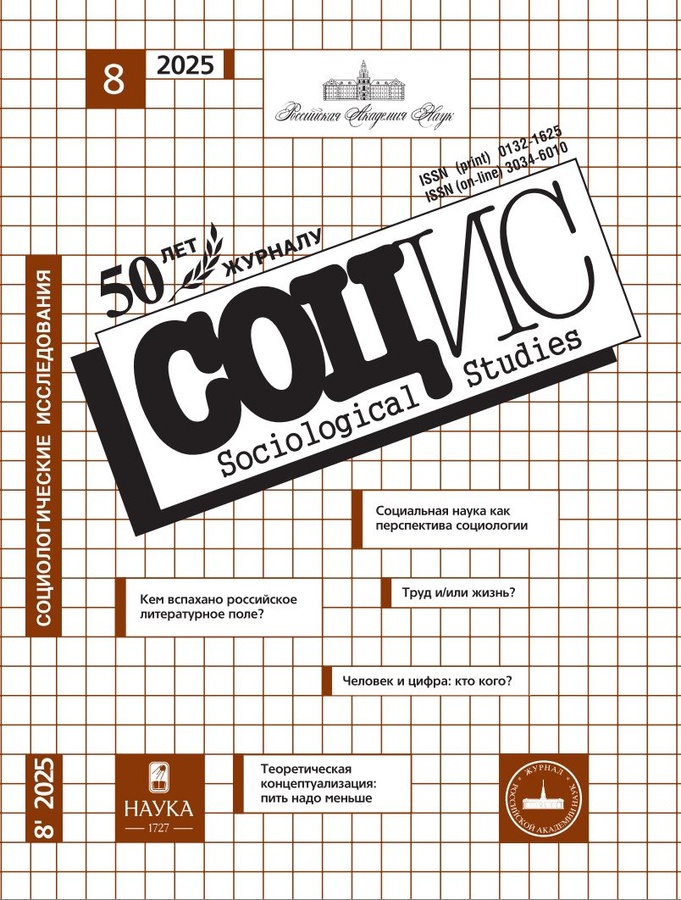Sotsiologicheskie issledovaniya
The journal publishes articles on a range of sociological science: theory, methodology and history of sociology, methods and results of sociological research in the field of economic, social, political and spiritual life of society in Russia and abroad. Target audience consists of research scholars, teachers of the theoretical and empirical sociological problems, including those related to contemporary society. It is addressed to specialists and personnel of sociological and information-analytical services of the government and public organizations, commercial structures. It is aimed at undergraduate, graduate, doctoral and postdoctoral students of social and humanitarian profiles, as well as at all interested in social problems of society's development and functioning. The editorial board of the journal "Sociological Studies" accepts for reviewing papers, including translations and original sources from the sociological heritage, reviews of scholarly conferences, book reviews and others.
Editor-in-chief: Grigory Arturovich Klyucharev, D.philos.n.
Frequency of publication and availability: 12 issues per year (monthly). The archive for 2014-2020 is laid out in a new format. https://www.socis.isras.ru/archive.html . The archive of issues from 2000 to 2015 in the old format can be found here .
Indexing: Web of Science (SCI), RSCI , Scopus, RSSI , RSCI Core, eLIBRARY.RU . It is included in the list of peer-reviewed scientific publications recommended by the Higher Attestation Commission.
ISSN 0132-1625 (Print)
Media registration certificate: ПИ № ФС 77 – 81528 от 27.07.2021
Current Issue
No 8 (2025)
XXVII KHARCHEV READINGS
"Dual Process" Theory in Social Cognition and Outlook to Augment Sociological Knowledge
Abstract
 3-13
3-13


Development of digital technologies and the agency issue: Towards a new theoretical optics
Abstract
 14-25
14-25


ECONOMIC SOCIOLOGY
“The Worker Sovereign”: a conversation with Axel Honnet
Abstract
 26-39
26-39


Samara school of labor sociology contribution to the labor motivation studies
Abstract
 40-52
40-52


DISCISSION. POLEMICS
Labor Transformation: Genesis of a New Social System? (Comments on a Discussion)
Abstract
 53-64
53-64


ANNYVERSARY
CHERNYSH M.F. is 70!
 65-65
65-65


Return of Society: Domestic Sociology in Search for Theory and New Generations (interview of M.F. Chernysh by Yu.B. Epikhina)
Abstract
 67-77
67-77


GOFMAN A.B. is 80!
 78-78
78-78


KNYAZEV V.N. is 80!
 79-79
79-79


SOCIAL STRUCTURE. SOCIAL POLICY
Social structure in the eyes of Russians: Issues of legitimacy
Abstract
 80-93
80-93


Human Potential in the Digitalization Context
Abstract
 94-107
94-107


Theoretical Conceptualization of the Social Transformation Mechanism in Alcohol Consumption Practices
Abstract
 108-118
108-118


ЭТНОСОЦИОЛОГИЯ
Formation and Development Features of the Russian-Speaking Koreans Community in South Korea
Abstract
 119-131
119-131


CULTURAL SOCIOLOGY
The Russian Literary Field in the 21st Century: Assessing its State Through Interviewing the Critics
Abstract
 132-141
132-141


FACTS. COMMENTS. NOTES
Perceptions of Russia and the USA by Japanese public opinion against the background of the SMO, negotiations and trade wars
Abstract
 142-146
142-146


Social tensions in the southern federal district: a retrospective protest practices analysis, 2015–2024
Abstract
 147-152
147-152


ACADEMIC EVENTS
Genocide – Ethnocide – Identity: Problematic Issues of the Russian-Serbian Academic Seminar
Abstract
 153-155
153-155


Civic and patriotic identity of the Russia’s youth
 156-157
156-157


Anniversary Readings on the Social Agenda in Sociological Research
 158-159
158-159


Social Processes in Modern Russian Society
 160-161
160-161


Support and Socialization of Men with Acquired Disabilities
 162-163
162-163


BOOK REVIEW
 164-168
164-168


Radayev V.V. Non-Standard Consumption. Moscow: VSHE, 2025.
Abstract
В монографии представлен сравнительный анализ пяти типов нестандартного потребления – панического, импульсивного, компульсивного, статусного и этичного. Автор показывает, что эти модели потребления являются не индивидуальным отклонением от рациональной нормы, а закономерной адаптацией к условиям кризиса, цифровизации и неопределенности. В рецензии обсуждаются наиболее интересные эмпирические результаты исследования, ставятся методические вопросы об измерении нестандартных форм потребления. Оценивается вклад рецензируемой монографии в развитие экономической социологии. Отмечается вывод автора об укорененности экономического поведения в социальных структурах и отношени
 168-173
168-173


BOOKS IN BRIEF
BOOKS IN BRIEFS
 174-174
174-174















